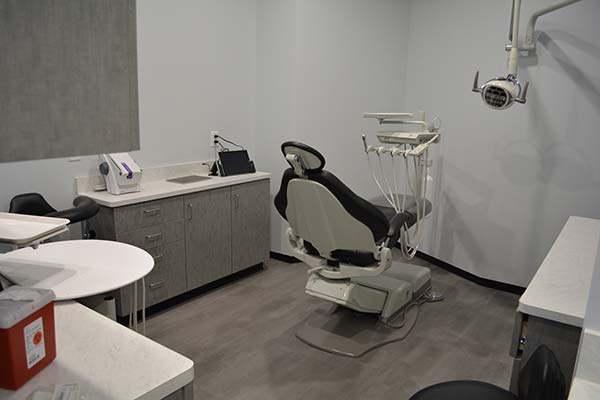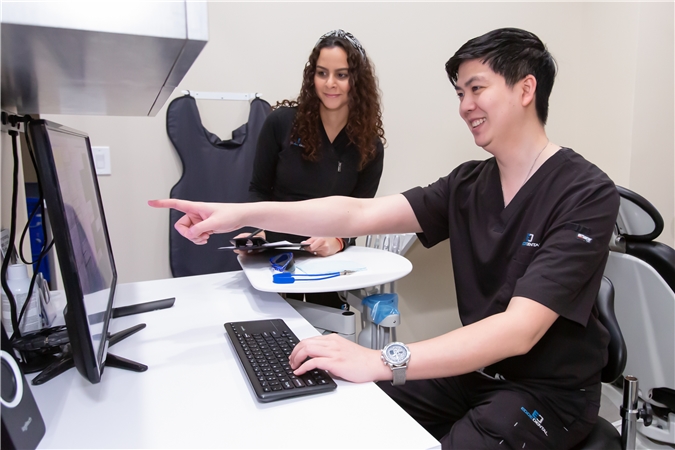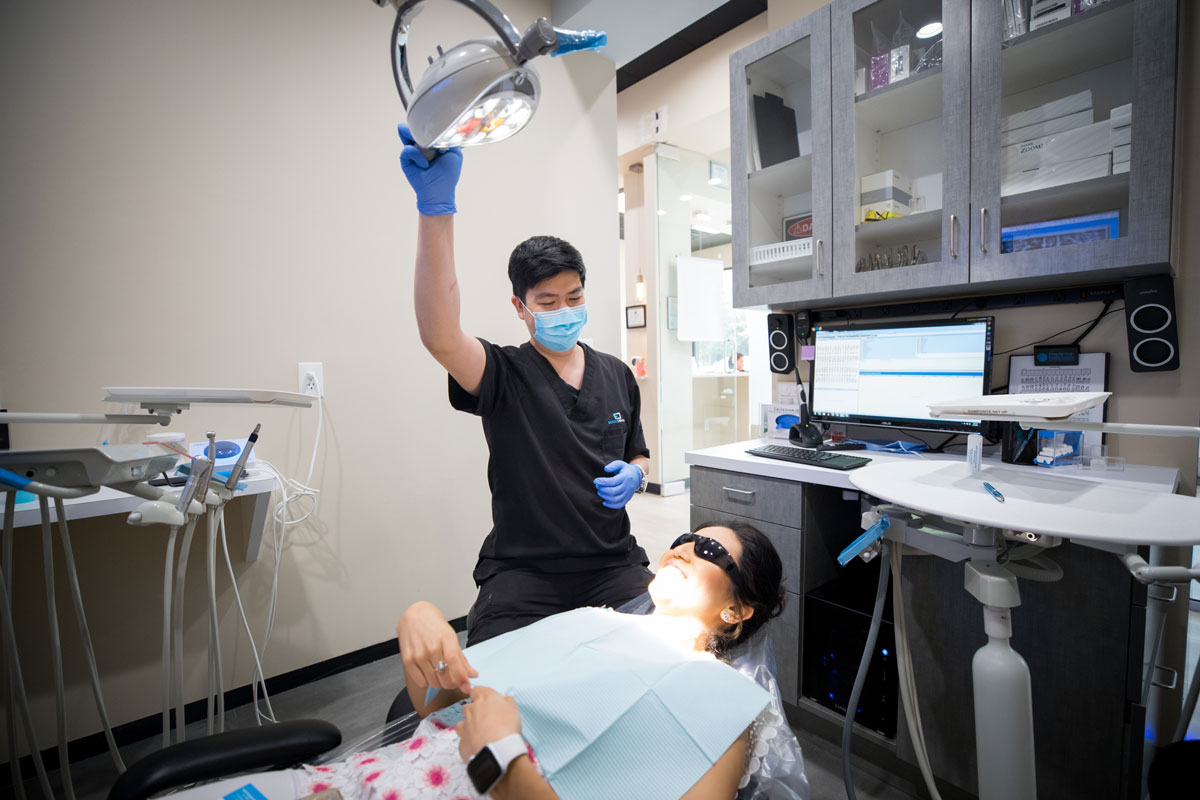Your mouth is made up of multiple working parts that work together to perform a wide array of different essential tasks every day. One of these components is the temporomandibular joints or TMJ. These joints, in conjunction with the attached muscles, ligaments, and bones, work together, enabling you to bite, chew, speak, and more. When the joints are healthy, you are most likely completely unaware that they are there. However, when the joints have been affected by any one of some different issues, you may be faced with significant pain and difficulties in using your mouth. Edge Dental can help.
TMJ Treatment
Your mouth is made up of multiple working parts that work together to perform a wide array of different essential tasks every day. One of these components is the temporomandibular joints or TMJ. These joints, in conjunction with the attached muscles, ligaments, and bones, work together, enabling you to bite, chew, speak, and more. When the joints are healthy, you are most likely completely unaware that they are there. However, when the joints have been affected by any one of some different issues, you may be faced with significant pain and difficulties in using your mouth. Edge Dental can help.
Do you suffer from pain in your jaw or difficulting chewing? You maybe suffering from TJM disorder.
Speak to our dentist to see what your best treatment options are.
What are the TMJ?
You have two TMJ. These joints are located on both sides of your face, right where the lower jaw connects to the skull. They are ball and socket joints with a small disc in the center. The discs function to absorb the impact that your mouth exerts on your jaw and TMJ. The joints work together with muscles, ligaments, and bones, enabling you to bite, chew, speak, and more.
What are the TMJ?
You have two TMJ. These joints are located on both sides of your face, right where the lower jaw connects to the skull. They are ball and socket joints with a small disc in the center. The discs function to absorb the impact that your mouth exerts on your jaw and TMJ. The joints work together with muscles, ligaments, and bones, enabling you to bite, chew, speak, and more.
Symptons of TMJ disorder may include: pain in your jaw, pain in your ear, facial pain,
and difficulting opening and closing your mouth.
Schedule your TMJ treatment appointment now.
TMJ Disorder
TMJ disorder is a term that refers to some different issues that impact the health of your jaw and TMJ. These issues can cause significant pain and interfere with your quality of life. Things like eating and speaking become difficult, even excruciating.
TMJ Disorder
TMJ disorder is a term that refers to some different issues that impact the health of your jaw and TMJ. These issues can cause significant pain and interfere with your quality of life. Things like eating and speaking become difficult, even excruciating.
Are your TMJ symptoms preventing you from doing your daily activities?
Speak to our dentist about treatment options.
Schedule now!
What Causes TMJ Disorder?
There are several different issues that can impact your TMJ. These issues include
• Facial trauma, which can result from a car accident, a fall, or a sports injury.
• Jaw dislocation, including whiplash.
• Bruxism, or grinding and clenching of your teeth.
• Certain types of arthritis, such as osteoarthritis or rheumatoid arthritis.
What Causes TMJ Disorder?
There are several different issues that can impact your TMJ. These issues include
• Facial trauma, which can result from a car accident, a fall, or a sports injury.
• Jaw dislocation, including whiplash.
• Bruxism, or grinding and clenching of your teeth.
• Certain types of arthritis, such as osteoarthritis or rheumatoid arthritis.
Do you hear a clicking sound when you open your mouth or chew?
This may be a sign that you are suffering from TMJ disorder.
Book your appointment online now.

How Do I Know if I Have TMJ Disorder?
Pain in your jaw and your TMJ are often the most common indicators of TMJ disorder. However, it is not the only one. There are several other symptoms that may occur as well. These symptoms include
• Swelling in your face and jaw near your TMJ.
• Trouble, and pain, while eating or speaking.
• Temporary lockjaw. This is a condition in which your jaw temporary locks open or closed.
• Clicking, popping or grinding sensations.
• Chronic headaches or earaches.
How Do I Know if I Have TMJ Disorder?

Pain in your jaw and your TMJ are often the most common indicators of TMJ disorder. However, it is not the only one. There are several other symptoms that may occur as well. These symptoms include
• Swelling in your face and jaw near your TMJ.
• Trouble, and pain, while eating or speaking.
• Temporary lockjaw. This is a condition in which your jaw temporary locks open or closed.
• Clicking, popping or grinding sensations.
• Chronic headaches or earaches.
Do you have TMJ disorder? Our dentist can help!
Call us to book your appointment.
Treatment Options for TMJ Disorder
If you are experiencing symptoms of TMJ disorder, it is important to schedule an appointment right away. With a thorough oral exam, we can determine the cause of your condition and determine the most effective treatment plan for you. Treatments vary based on the severity of your condition as well as what the exact cause of your TMJ disorder is. Treatments include
• At-home remedies. If your TMJ disorder is mild, you may be able to manage it at home with home remedies such as over the counter pain relievers, ice packs, stress relief tactics, and eating a TMJ friendly diet.
• A night guard. This is an oral appliance that is worn while you sleep. Commonly prescribed for bruxism, a night guard fits over your teeth, providing a cushion against grinding and clenching.
• Orthodontics. If crooked teeth or crooked jaws are causing your TMJ pain, orthodontic treatment can help.
• Oral surgery. There are a few different surgical procedures that may be recommended in severe cases or when no other treatments have proven effective.
Treating TMJ disorder restores your oral health, allowing your mouth to function normally, while also restoring your quality of life. Call Edge Dental at (281) 940-8940 for more information and to schedule your consultation today.
Visit Our Dental Office in Houston
Edge Dental Houston is a state-of-the-art dental office led by one of the best dentists in Houston. Our dental clinic is located in one of the most convenient parts of Memorial City — 15455 Memorial Dr #400 Houston. Our dental clinic is right beside the Katy Freeway and a short walk from some of the city’s most iconic landmarks, including the Bear Creek Pioneers Park and George Bush Park. If you’re looking for a conveniently located dentist’s office near me, you’ve come to the right place. Please schedule an appointment at our dental office in Houston or call (281) 940-8940.




